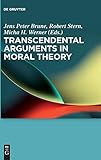Transcendental Arguments in Moral Theory / ed. by Jens Peter Brune, Robert Stern, Micha H. Werner.
Material type: TextPublisher: Berlin ; Boston : De Gruyter, [2017]Copyright date: ©2017Description: 1 online resource (VII, 357 p.)Content type:
TextPublisher: Berlin ; Boston : De Gruyter, [2017]Copyright date: ©2017Description: 1 online resource (VII, 357 p.)Content type: - 9783110469806
- 9783110469899
- 9783110470215
- online - DeGruyter
- Issued also in print.
| Item type | Current library | Call number | URL | Status | Notes | Barcode | |
|---|---|---|---|---|---|---|---|
 eBook
eBook
|
Biblioteca "Angelicum" Pont. Univ. S.Tommaso d'Aquino Nuvola online | online - DeGruyter (Browse shelf(Opens below)) | Online access | Not for loan (Accesso limitato) | Accesso per gli utenti autorizzati / Access for authorized users | (dgr)9783110470215 |
Frontmatter -- Table of Contents -- Introduction -- A. Reflexions on the general structure and problems of transcendental arguments -- Silencing the Sceptic? The Prospects for Transcendental Arguments in Practical Philosophy -- Ambition, Modesty, and Performative Inconsistency -- On Pain of Self-Contradiction? -- Claims as Departure Points for Transcendental Arguments: Understanding Argumentation as a Game -- Still Lonely: The Moral Solipsist after Transcendental Argumentation -- B. Uses and discussions of transcendental reasoning based on the self-reflective structure of personal autonomy, rational agency, or human self-understanding -- Constitutivism and Transcendental Practical Philosophy -- Transcendental Arguments for a Categorical Imperative as Arguments from Agential Self-Understanding -- Transcendental Arguments and Practical Self-Understanding—Gewirthian Perspectives -- Transcendental Arguments in Favour of Absolute Values -- Neither for Beasts nor for Gods: Why only morally-committed Human Beings can accept Transcendental Arguments -- C. Transcendental reasoning inspired by pragmatism, linguistics, and theories of intersubjectivity -- Normative Pragmatics: Approach, Promise, Outlook -- Social Constitutivism and the Role of Retorsive Arguments -- Transcendental-Pragmatic Foundation of Ethics. Transcendental Arguments and Ethics -- Conceptual Pragmatism and Normativity: Clarence Irving Lewis -- Transcending Value: Two Readings of Performative Inconsistency -- Transcendental Anti-Theodicy -- Argumentative Discourse: The Transcendental Starting Point of Apelian Discourse Ethics -- Notes on Contributors -- Index
restricted access online access with authorization star
http://purl.org/coar/access_right/c_16ec
Since Barry Stroud's classic paper in 1968, the general discussion on transcendental arguments tends to focus on examples from theoretical philosophy. It also tends to be pessimistic, or at least extremely reluctant, about the potential of this kind of arguments. Nevertheless, transcendental reasoning continues to play a prominent role in some recent approaches to moral philosophy. Moreover, some authors argue that transcendental arguments may be more promising in moral philosophy than they are in theoretical contexts. Against this background, the current volume focuses on transcendental arguments in practical philosophy. Experts from different countries and branches of philosophy share their views about whether there are actually differences between “theoretical” and “practical” uses of transcendental arguments. They examine and compare different versions of transcendental arguments in moral philosophy, explain their structure, and assess their respective problems and promises. This book offers all those interested in ethics, meta-ethics, or epistemology a more comprehensive understanding of transcendental arguments. It also provides them with new insights into uses of transcendental reasoning in moral philosophy.
Issued also in print.
Mode of access: Internet via World Wide Web.
In English.
Description based on online resource; title from PDF title page (publisher's Web site, viewed 30. Aug 2022)


